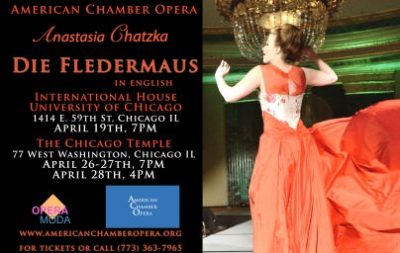Die Fledermaus by American Chamber Opera
Die Fledermaus Scaled Way Down
One cannot help but admire the American Chamber Opera’s stated goal—though I might have wished to see it printed in their grossly inadequate program—of making opera more accessible by putting on small scale productions of great standards of the repertoire, all sung in English. Johann Strauss II’s Die Fledermaus (1874), though possessing nothing of the substance of the two other operas the company will present this year, The Magic Flute and Carmen, it is, in its own right, a classic of the genre of light operetta, particularly in the Viennese style, whose greatest representation is probably Franz Lehar’s The Merry Widow (1905). The overture will be immediately recognizable to those who have not seen the opera: It is Strauss at the height of his powers; infectious, effervescent, and sweet, though perhaps not much more. One cannot help but be tickled pink by this at first, though it is questionable whether it has the lasting power of a 2 and a half hour opera. No orchestra here, just a string quartet, and pianist playing the orchestral reduction; but this actually substitutes rather well. And the company clearly has the voices to put on a greatly scaled down version of the opera. The staging, costuming, and choreography, I’m afraid to say, is another matter.
The conceit of the opera is that Gabriel von Eisenstein (Edward MacLennan), probably a wealthy man of Viennese society, is due to begin an Eight day jail sentence for assaulting a magistrate, partly due to the incompetence of his stammering lawyer Dr. Blind. A serenading Italian tenor Alfred (Matthew Dingels) is waiting in the wings to seduce Eisenstein’s wife Rosalinde (Kelsey Betzelberger). Eisenstein’s maid Adele (Juli Bunyak) has been invited by her sister in the ballet to an elegant ball to be given that very evening by a Russian Prince Orlofsky (Elena Snow). And sooner or later every one seems to be on their way to the ball, because Eisenstein has been goaded to go a-philandering by his friend Dr.Falke, and Rosalinde herself been has been asked to go masked, as a mysterious Hungarian countess. It is, of course, one large scheme put together by Dr. Falke and the Prince, the unraveling of which will constitute the rest of this broadly farcical, yet quite entertaining opera. The melodies, despite their undoubted charm, are nothing to write home about—certainly nothing in the league of Sullivan’s show-stopping tunes for what were at times even more farcical libretti—but they are about as good as Johann Strauss II can get. And yet to appreciate all their vivacity, and ravishing, if at times superficial appeal, a company really needs to pull out all the stops. The American Opera Company has put together a decent cohort of voices for a production of this size: Kelsey Betzelberger as Rosalinde, and Elena Snow, in the trouser role of Prince Orlofsky, are notable. The staging, however, reminds one of a high school musical, and any choreography that Greg Tufts, conductor and stage director and his two assistants Hannah Balash and Carrie Kocsis have put together is at times painful to watch. The Ameican Chamber Opera apparently brought on the designer Anastasia Chatzka as a sort of producer, so prominently is her name displayed in the program, but as costume designer for this show she fails miserably. The bizarrely eclectic group of dresses remind one more of a fashion show—and perhaps that was the intention—than anything anyone would seriously consider wearing to an Viennese ball, even in the 21st century. I normally think of costumes as a trivial matter, but here it is essential to the ethos of the piece. Instead of elegance, there is something awfully rag-tag about all of this. And the Company might have done its audience the dignity of including such things in the program as the setting for the opera, the name of the original German librettist, who were Karl Haffner and Richard Genee, and perhaps a brief synopsis, with a list of arias. Without such basic signs of professionalism, the American Chamber Opera risks squandering the talent and energy it has brought together.
Somewhat recommended.
Samuel Wigutow
Date Reviewed: April 19, 2013
Friday, April 19, 7:00 pm:
Chicago, IL 60637Friday, April 26, 7:00 pm:
Chicago Temple
Chicago, IL
Chicago Temple
Chicago Temple

